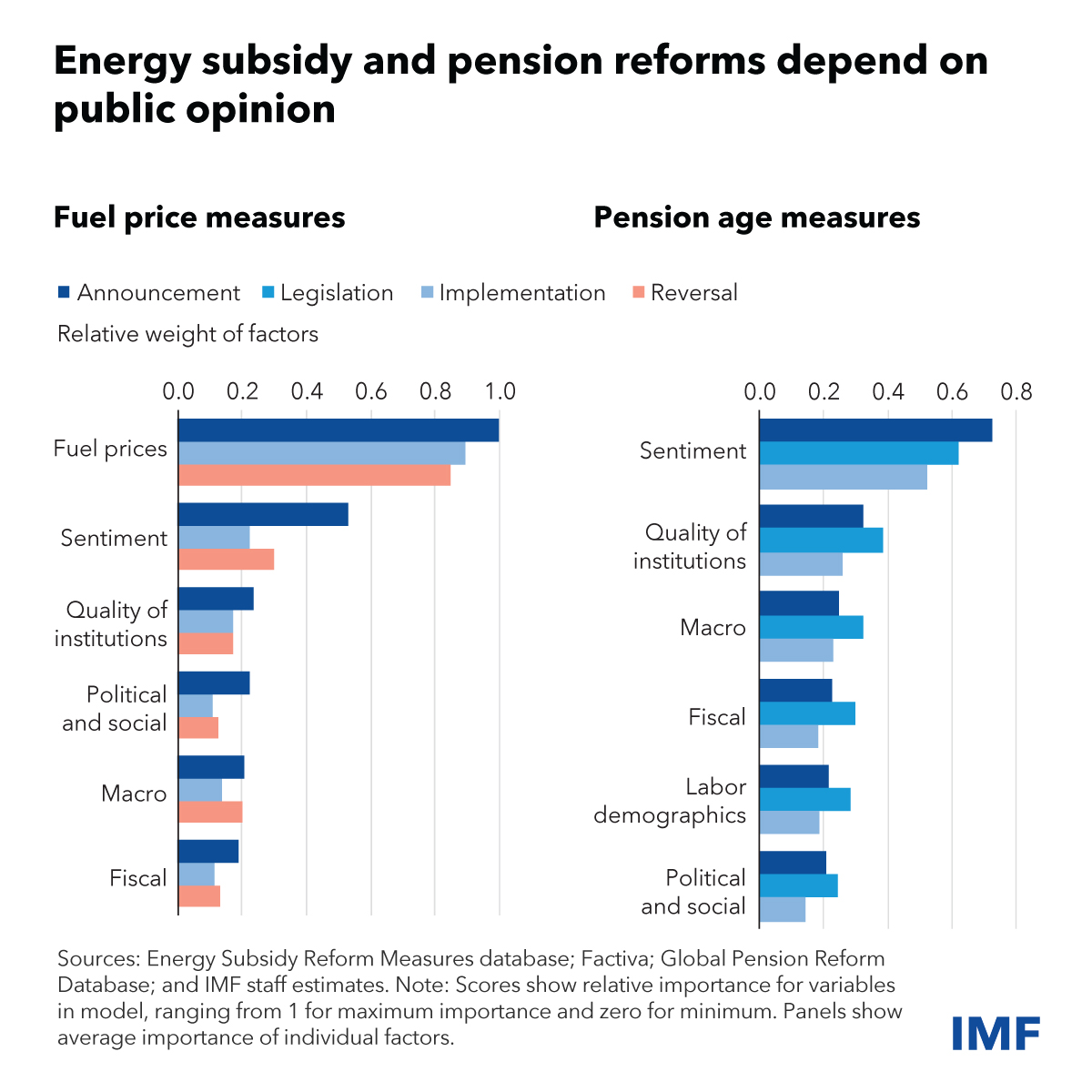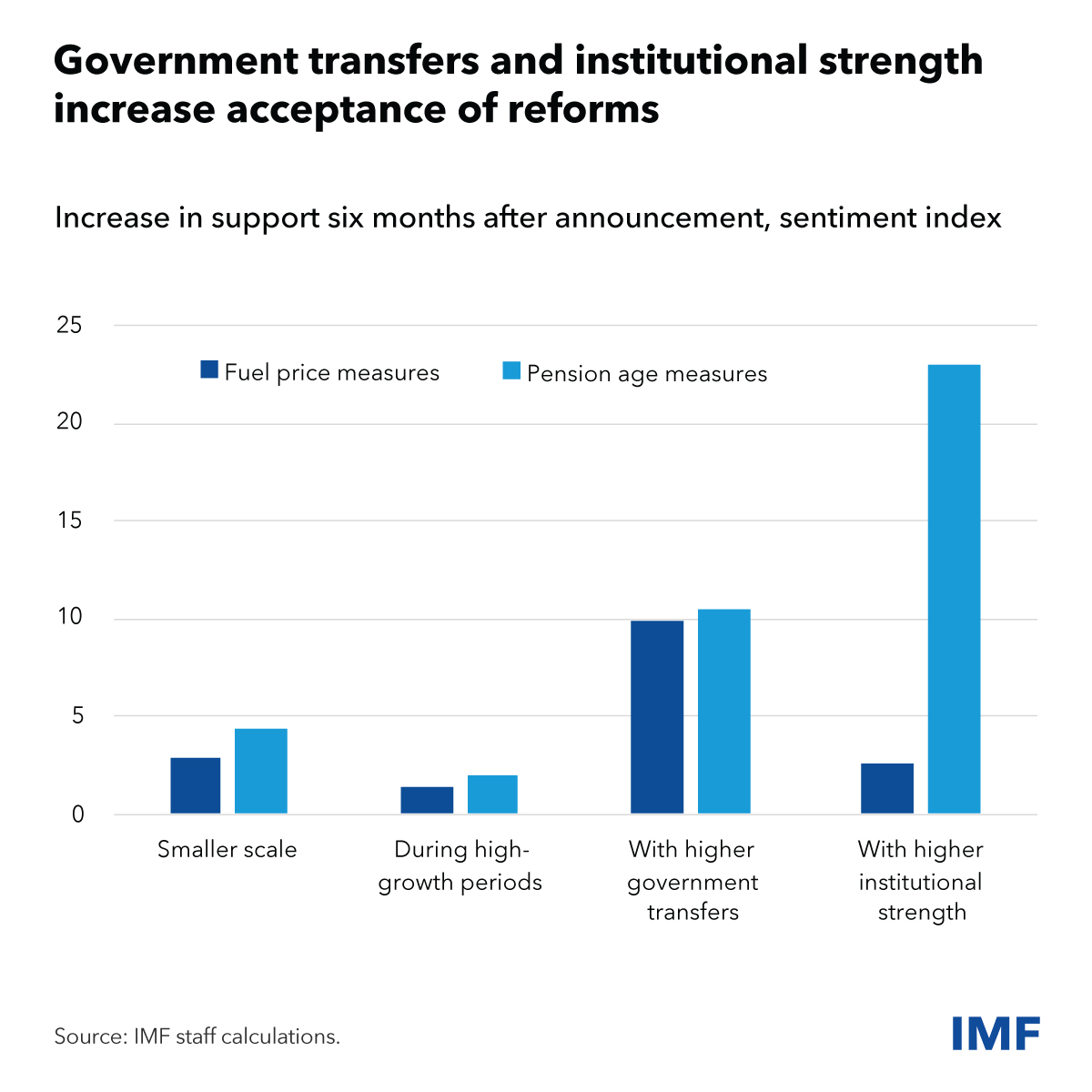Many countries struggle with low economic growth and high debt and will need bold fiscal actions to restore their finances. Two significant areas for potential savings are energy subsidies and pension systems. However, reforms in both areas can be unpopular with the public.
Public support is crucial for the success of these reforms, and governments can leverage various strategies to enhance this support. As highlighted in the April 2025 Fiscal Monitor, we developed a new method to gauge public sentiment by analyzing more than 2 million news articles tracking energy subsidy reforms in 170 countries since 1990 and pension reforms in 134 economies since 1960.
Effective reform involves well-designed changes that are introduced at the right time to gain more public support. Changes that happen gradually and during good economic times are usually viewed more favorably. Policies that focus on redistributing resources to those most affected, building trust in institutions, and communicating effectively can lessen public resistance to reforms. The money saved from these reforms can be used to support popular social programs and infrastructure projects that people can see and appreciate. Additionally, strong political commitment and a sense of ownership among leaders are crucial for gaining agreement and support for these changes.
Fiscal impact
Reforming energy subsidies and pension spending is crucial for improving public finances and promoting inclusive growth. And they can yield big returns.
On average, emerging and low-income countries spend 1.5 percent of their gross domestic product on energy subsidies, which is more than they allocate for social spending for poor people. Moreover, fuel subsidies mainly benefit higher income groups as they consume more fuel. By reducing these subsidies, countries can free up funds for other uses, eliminate price distortions, promote more efficient energy use, and foster long-term inclusive growth.
Pension spending accounts for 8 percent of GDP in advanced economies and 4 percent in emerging markets, with projections showing a sharp increase as populations age. Implementing pension reforms can help ensure the sustainability of retirement systems, and support employment, especially for the youth.
Sentiment matters
Making significant changes to energy subsidies and pension systems is challenging. Fuel price increases are always unpopular. And changes to social security systems can cause worries about contributing more money or having to work longer before retiring.
To successfully implement these reforms, it is essential to improve sentiment among key stakeholders in society. Our research shows that public support is the most important indicators of successful pension reforms, especially when families, civil society organizations, labor unions, and opposition groups back the changes. For energy subsidies, having positive public sentiment is almost as crucial as the actual changes in fuel prices.

How to bolster support
Policymakers can use various strategies to gain support for reforms. When possible, implementing gradual reforms allows individuals and businesses time to adjust, which can enhance public support. For instance, Colombia successfully implemented a two-year timeline for gasoline price adjustments. Sticking to this schedule helped build public trust and reduced resistance. However, while the government successfully removed gasoline subsidies, the process of eliminating costly diesel subsidies has been much slower.
Timely interventions during periods of strong economic growth allow for phased reforms that ease public concerns. This was evident in the case of Germany when the retirement age was successfully increased. Unfortunately, not all countries have the luxury of time. In Morocco, for example, the government had to quickly increase fuel prices by about 20 percent to address urgent budget pressures. This rapid increase demonstrated the government’s commitment, prepared citizens for future changes, and set the stage for fully eliminating subsidies.

Quickly compensating those affected by reforms can help build support and reduce concerns. Australia managed to increase the pension age while providing a substantial boost in old-age benefits, of over 10 percent for low-income retirees. However, some of these actions can have long-term consequences. For example, in response to the energy price surge in 2022, governments in Europe lowered taxes and provided cash transfers to ease public discontent. While these measures addressed immediate issues, they also postponed necessary adjustments to higher prices that will need to be made in the future.
Clear communication
Effective communication and engagement with stakeholders are essential for gaining public support for fuel subsidy and pension reforms. By clearly explaining how these reforms improve the country’s financial health and expand public services, concerns can be reduced, and support can be increased. In Morocco, a well-planned communication strategy was used to involve various groups during the fuel subsidy reform. This strategy highlighted that subsidies were not an effective way to provide social support, which helped alleviate worries and build backing for the reforms.
Ownership and political commitment are key to building consensus toward more ambitious reforms. In Uruguay, the president made raising the retirement age a central part of his government’s policy, and actively engaged with key political stakeholders to create consensus for the reform.
In conclusion, while gradual reforms during periods of economic prosperity are easier, many countries often need to make significant adjustments during challenging times. In both cases, public sentiment is very important for success. Governments must invest as much effort in clear communication, engaging in education and bringing along stakeholders as they do in the technical aspects of these complex reforms.
—This blog is based on Chapter 2 of the April 2025 Fiscal Monitor, “Public Sentiment Matters: The Essence of Successful Energy Subsidies and Pension Reforms.”






